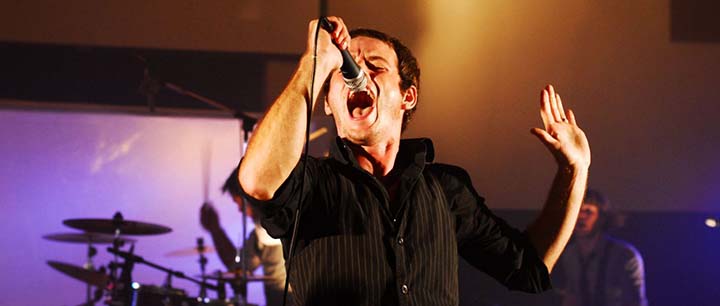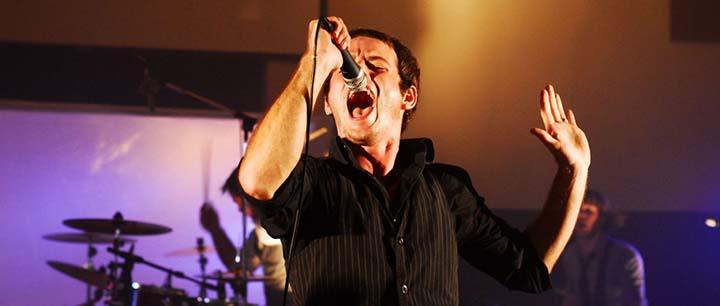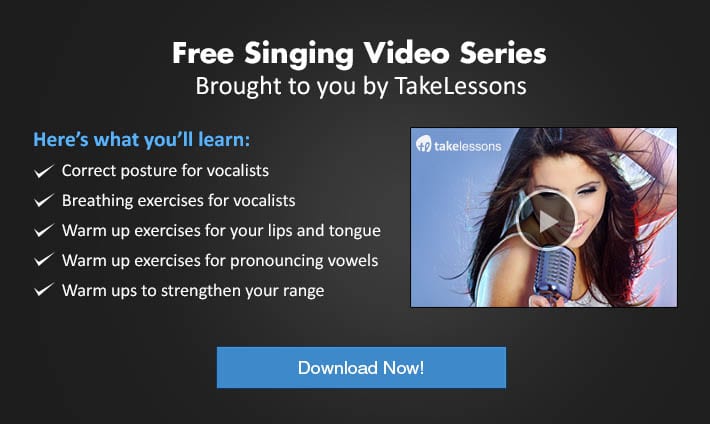 Do you love singing, but worry about what others might think of your voice? Has something been holding you back from performing, playing an instrument, or taking lessons? Read on as teacher Dan G. examines the culture of fear today – and how to overcome it:
Do you love singing, but worry about what others might think of your voice? Has something been holding you back from performing, playing an instrument, or taking lessons? Read on as teacher Dan G. examines the culture of fear today – and how to overcome it:
As a musician, student, and teacher of many years, I have become aware of a certain enigma surrounding music in our culture, specifically in relation to the experience commonly known as “fear.” Music was originally a sacred art form. In native cultures worldwide, music was used as a way of connecting with nature, with each other as a community, and for individuals with their own selves. It wasn’t something that only the “musicians” did while everyone else sat and watched. Everyone was a musician, everyone sang and danced together, and I don’t think there was so much fear surrounding it. Song was a part of the everyday experience just like brushing your teeth or commuting to work or school in the morning. You didn’t have to “learn” how to sing.
So You Think You Can’t Sing?
I was recently sitting before a class of eight young music students talking about jazz and improvisation. I asked one student to sing an improvised melody over a chord progression a piano student was playing for us. “I don’t sing,” was his response. So I asked the next student to do the same and received a similar response. I then went down the line asking every single student if they would sing a melody over the chords and not a single one was willing to try. I even gave them an example, singing a simple melody for them over the piano, but still no go. This wasn’t a unique experience in my teaching career. Why are we so afraid to do something as simple as use our voice, something most of us do every single day, in an artistic, expressive way?
I am not exactly sure, but here are some ideas I have about it: Somewhere along the way, music departed from its original purpose – celebration, expression and connection – to what we have today – black-and-white-clad “professionals” playing on stage for unseen audience members in the dark below, only allowed to clap or make noise at certain intervals. Western society has promoted this “musician” idea so much that people now take for granted statements such as, “Oh, I can’t sing” or “Oh, I don’t know how to play music.”
In fact, we all know how to play music. We all know how to sing. Just as we all know how to express how we feel to those we love, or what to eat when we are hungry.
In India, I heard that the first thing any music student learns, whether he or she is an instrumentalist or not, is how to sing. It is believed that the voice is the most basic and primary of all the instruments. Another concept they have there is that of “sadhana,” or “a practice that brings one joy and happiness.” In certain Indian musical traditions, the success of a performance or concert is judged not by technical execution, but by the state of mind that is reached while playing and singing. The happier everyone gets while singing and playing, the more successful the concert. I’d like to see this approach become more common here in North America.
Singing and the Culture of Fear
I often think about where exactly we learned to be fearful of making sound. I wonder if it was from other kids in school making fun of us when we talked or used our voice, or maybe it was a music teacher we had that made us feel like we were “not doing it correctly,” or maybe the fear just got passed down from our parents, who learned it from their parents, and so on down the line all the way back to some guy in Germany who decided that music should only be played by the professionals on stage, while everyone else listens. Whatever it is, I think it is safe to reverse the progression now.
I am not against performance and the development of technical skill. This is a beautiful and wonderful thing, and something that I hope continues forever into the future. But what I would like to see is this fear of expression being transmuted into joy and excitement, the natural by-products of practicing music.
So here are some questions that I would like to ask you: Would you like to sing? Would you like to play your instrument before an audience? Would you like to share your music with your friends, your community, and the folks you know? Do you feel afraid at the thought of doing this? And more importantly, do you think that this fear you feel is a signal that you shouldn’t go ahead and do it anyway or that you should?
I encourage all you music students out there (that’s everyone on the planet and beyond) to go ahead and share the music inside you with everyone. Even if your voice shakes. Even if your palms sweat. Even if it feels like you are walking to your funeral. In the end, it’s not about whether you were out of tune or not. It’s not about the feedback you receive from others. It’s not really about what you sound like at all. But it’s about the fact that you had the courage to do what you felt inspired to do, no matter the result, and the connections, growth, and fun you had while doing it.
 Daniel has performed, studied, and taught music for many years across the country. He plays mostly strings, the bass, cello, and guitar, but loves all sorts of instruments, including the voice. He loves helping his students see past the fears that often hold us back, to the light beyond. He currently lives and teaches music lessons in Grass Valley, Northern California. Learn more about Daniel here!
Daniel has performed, studied, and taught music for many years across the country. He plays mostly strings, the bass, cello, and guitar, but loves all sorts of instruments, including the voice. He loves helping his students see past the fears that often hold us back, to the light beyond. He currently lives and teaches music lessons in Grass Valley, Northern California. Learn more about Daniel here!
Photo by Thomas Beck
Megan L.

